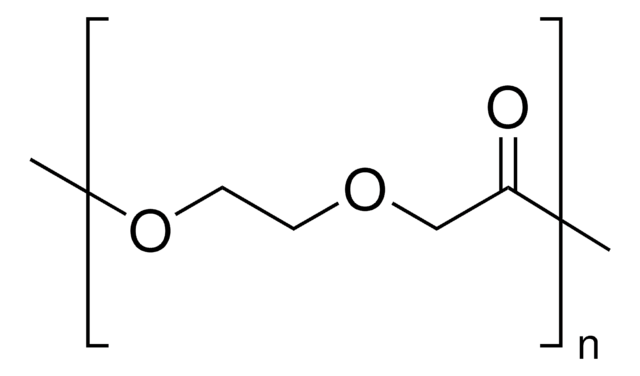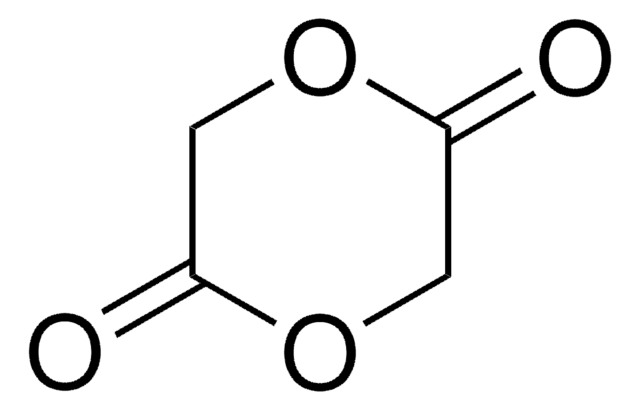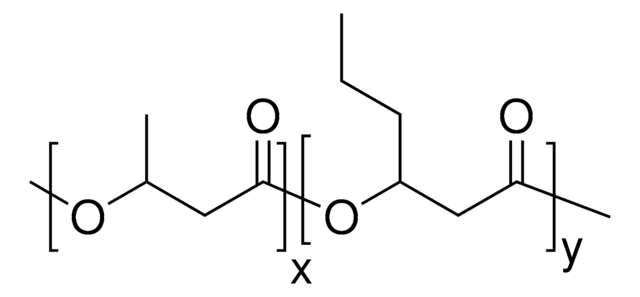Wszystkie zdjęcia(1)
Kluczowe dokumenty
901020
Poly(dioxanone-co-glycolide)
90:10, viscosity 2.0 dL/g
Synonim(y):
PDO-PGA, PDS-PGA
Zaloguj sięWyświetlanie cen organizacyjnych i kontraktowych
About This Item
Wzór liniowy:
(C4H6O3)m(C4H4O4)n
Kod UNSPSC:
12162002
NACRES:
NA.23
Polecane produkty
Poziom jakości
Formularz
chips
proporcje
p-dioxanone:glycolide 90:10±5
kolor
white to off-white
lepkość
1.5-2.5 dL/g
2.0 dL/g
temp. przechowywania
−20°C
Powiązane kategorie
Opis ogólny
Poli( dioksanon-co-glikolid) jest biodegradowalnym kopolimerem syntetyzowanym z polimeryzacji z otwarciem pierścienia p-dioksanonu i glikolidu. Ze względu na wiązania estrowe znajdujące się w szkielecie polimeru, polimery te są zdolne do degradacji poprzez hydrolizę. Przy różnych stopniach alifatyczności, stosunek dwóch monomerów wpływa na szybkość hydrolizy, a tym samym na szybkość degradacji. Inne czynniki wpływające na degradację tych materiałów mogą obejmować zastosowanie końcowe lub metody przetwarzania po polimeryzacji.
Zastosowanie
Poli(dioksanon-co-glikolid) to biodegradowalny kopolimer charakteryzujący się wysoką wytrzymałością poli(dioksanonu) i elastycznością poli(glikolidu) do zastosowań w badaniach biomedycznych, takich jak urządzenia biomedyczne, systemy dostarczania leków i konstrukcje inżynierii tkankowej.
Ta strona może zawierać tekst przetłumaczony maszynowo.
Kod klasy składowania
11 - Combustible Solids
Klasa zagrożenia wodnego (WGK)
WGK 3
Temperatura zapłonu (°F)
Not applicable
Temperatura zapłonu (°C)
Not applicable
Wybierz jedną z najnowszych wersji:
Certyfikaty analizy (CoA)
Lot/Batch Number
Nie widzisz odpowiedniej wersji?
Jeśli potrzebujesz konkretnej wersji, możesz wyszukać konkretny certyfikat według numeru partii lub serii.
Masz już ten produkt?
Dokumenty związane z niedawno zakupionymi produktami zostały zamieszczone w Bibliotece dokumentów.
Produkty
Main features of p-dioxanone, glycolide and lactide based copolymers
Nasz zespół naukowców ma doświadczenie we wszystkich obszarach badań, w tym w naukach przyrodniczych, materiałoznawstwie, syntezie chemicznej, chromatografii, analityce i wielu innych dziedzinach.
Skontaktuj się z zespołem ds. pomocy technicznej








